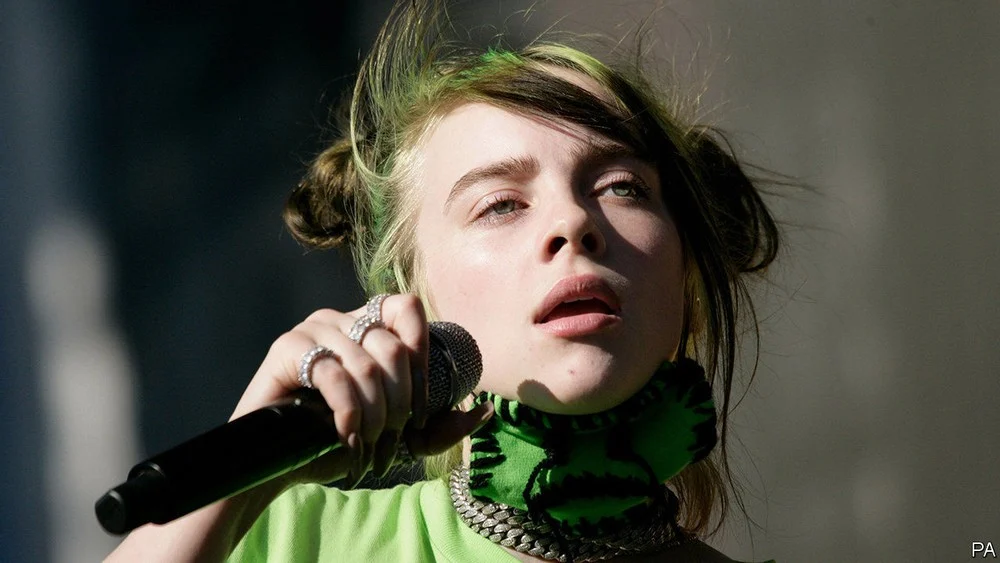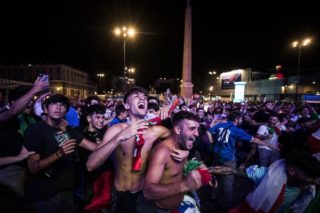“When I Have Fears” by The Murder Capital
The fertile music scene in Dublin produced excellent albums by Fontaines DC and Girl Band this year; best of all was the first from The Murder Capital, a sharply dressed quintet with an explosive, balletic stage presence. “When I Have Fears” didn’t necessarily offer anything new—its debt to Joy Division was undeniable—but it was performed with a ferocity and conviction that took it beyond mere pastiche. On “Slowdance II”, the band offered the most mesmerising guitar hook of any rock record this year.
“When We All Fall Asleep, Where Do We Go?” by Billie Eilish
The breakout pop star of 2019 was Billie Eilish, a young woman who could only have been more teenage if she had refused to come out of her room to release her album. The sulkiness belied a fabulously sharp collection, brilliantly produced by Ms Eilish’s brother, Finneas O’Connell. The songs were pared back, making the hooks all the more deadly and the lyrics all the more insinuating. “Bad Guy” was such a great song that, as with “Despacito” in 2017, Justin Bieber felt obliged to muscle in and add his voice to a new version.
“Father of the Bride” by Vampire Weekend
The first Vampire Weekend album in six years had to contend with the fact that the group’s signature sound—globally inflected indie rock—had become doubly unfashionable in the intervening period. Were the global elements just cultural appropriation? And who cared about indie rock? “Father of the Bride” was not perfect, but it had moments so incandescent you could forgive almost anything. “Harmony Hall”, the first song to combine folk rock and Italo House, had the swooping, nostalgic, privileged melancholy of a Donna Tartt novel.
“Nothing Great About Britain” by Slowthai
The rapper brought the parent-scaring possibilities of Johnny Rotten to British hip-hop, with a debut album that offered vignettes of lives at the edge of order (in which youngsters throw up on street corners having smoked weed). “Doorman” was a song that sounded like the world Slowthai was portraying—hard and brittle and angry, with samples from TV news reports. The music was shot through with the very darkest of humour, even in the choice of news stories: “Cyril is a glue man / And his outlook on life is invariably, through a plastic bag.”
“Psychodrama” by Dave
The rap sensation of the year was Dave, from south London. After a string of daring singles—notably “Question Time”, in which he addressed politics both domestic and international—his first album was a dense, intense and deeply personal record. “Black”, a complex, layered exploration of black British identity, was an astonishing feat, and a declaration of British rap’s independence: “Black is so much deeper than just African-American.”
“Norman Fucking Rockwell!” by Lana Del Rey
Evolution, rather than revolution, was the order of the day for Lana Del Rey. The songs on “Normal Fucking Rockwell!” were, once again, stately and grand and draped in ennui, but this time she was reaching back to Laurel Canyon for inspiration, rather than borrowing from electronic pop and hip-hop to colour in the background.
“Absolute Zero” by Bruce Hornsby
Bruce Hornsby, a middle-of-the-road star in the 1980s, has spent nearly 30 years fleeing that past. On “Absolute Zero” he combined contemporary classical music, jazz, Americana and the melodiousness that made him a star in the first place. The music was based on cues he had written for Spike Lee, a film-maker, and the lyrics covered race, space exploration and physics, with nods to David Foster Wallace. It was a remarkable record—one that destroyed the expectations of listeners who only remembered “The Way It Is”—and a complete delight.
“Remind Me Tomorrow” by Sharon Van Etten
“Remind Me Tomorrow” opened with a bombshell of a lyric: “Sitting at the bar, I told you everything / You said, ‘Holy shit, you almost died.’” The listener never found out what the “everything” was, which was fitting, because “Remind Me Tomorrow” was an album of clues rather than revelations. Its centrepiece, “Seventeen”—a brilliant, almost gothic reimagining of 80s soft rock—explored the possibilities that disappear as life’s vicissitudes take their toll: “I used to be free / I used to be seventeen.”
“Ragamuffin SoundTape” by Shy FX
A quarter of a century on from releasing “Original Nuttah”, one of the defining tracks of the UK ragga scene, Shy FX provided a reminder that the current wave of hip-hop had its antecedents, and that the black music tradition in Britain owes a huge debt to reggae sound systems. “Raggamuffin SoundTape” didn’t bother with a coherent mood, with Shy FX instead offering listeners a guided tour through a couple of decades of digital reggae styles, aided by special guests from the wholly appropriate (Chronixx, Kojey Radical) to the wholly unexpected (Cara Delevigne). It was carnival in one album.
“Thrashing Thru the Passion” by The Hold Steady
The Brooklyn rock band had their moment of critical exaltation a decade or so ago, but rather lost their way. On “Thrashing Thru the Passion” they rediscovered it, brawny riffs and brainy lyrics matched evenly over 10 songs about people whose lives are drifting out of focus into “tiny little triumphs, massive bloody failures”. Pop-culture nerds could spend hours poring over the details in Craig Finn’s lyrics.
“Jaime” by Brittany Howard
Brittany Howard, the frontwoman for the Alabama Shakes, steered away from her group’s rock’n’soul style for her solo debut. The soul was there, but the rock had been expunged, and she bared herself more fully than she ever has on record before. Sometimes the songs were simply gorgeous (“Stay High”), but sometimes they were terrifying. “Goat Head” remembered a biracial childhood in the Deep South, and how her parents tried to protect her from the racism they experienced: “Who slashed my dad’s tyres and put a goat head in the back? / I guess I wasn’t s’posed to know that, too bad.”
“On the Line” by Jenny Lewis
On Jenny Lewis’s fourth solo album—her 10th in various guises—her soft rock was spikier than ever. The effect of “On the Line” was cumulative: any single track was pleasant enough, but taken as a whole they were quietly devastating.
“Titanic Rising” by Weyes Blood
The portrait of Los Angeles painted by Natalie Mering, who records as Weyes Blood, seemed a little askew. Perhaps it was the slightly formal nature of her delivery—no matter how beautiful the melodies or mellow the pace, “Titanic Rising” did not feel like a relaxing record—that made it feel so unsettling. Or maybe it was the oddness of her observations: “The other night, I was at a party / And someone sincerely looked at me / And said, ‘Is this the end of all monogamy?’” she sang on “Everyday”, over a jaunty piano romp.
“Kiwanuka” by Michael Kiwanuka
“Big Little Lies”, a mini-series, lifted Michael Kiwanuka’s profile higher than ever; he capitalised with his best album yet. He expanded his style of jazzy soul to include fuzzy psychedelia, lush orchestration and pounding R’n’B. It lent itself to dinner-party playings, but closer listening revealed it to be an album wracked by doubt, looking for something to justify hope in desperate times. It was the triumph he had never quite managed before.
“Silences” by Adia Victoria
Hip-hop and R’n’B have become the de facto musical vehicles for the concerns of people of colour in America, but Adia Victoria returned to the source of the African-American musical tradition—the blues—for her own meditation on race, religion, sexual politics and oppression. The version of the blues on “Silences” was not one of weary 12-bar chugs. It had room for the chilling and the thrilling; it was haunted by death and yet it burst with musical life.
By The Economist





